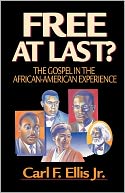 At The Sankofa Institute we are reading Carl Ellis’ Free At Last: The Gospel in the African-American Experience. Outside of the Bible this is the most influential book in my life. Ellis is seeking to demonstrate a way for all cultures to apply biblical truth to their history. He writes:
At The Sankofa Institute we are reading Carl Ellis’ Free At Last: The Gospel in the African-American Experience. Outside of the Bible this is the most influential book in my life. Ellis is seeking to demonstrate a way for all cultures to apply biblical truth to their history. He writes:
Though written from an African-American perspective, this work is not intended only for an African-American audience. Using the African-American cultural experience as the point of contact, I have attempted to forge a fresh understanding of how God by his grace is active in culture.
His thesis is this: There are parallels between African-Americans and the Israelites in the Old Testament. Just like God did for Israel, he also set African-Americans free from slavery so he could lead us to a promised land that we might be a light for the nations. We have yet to enter God’s promised land, in large part, because of failed leadership.
Parallels in History
Ellis points out what many others have observed as well: the parallels between Israel in the Old Testament and African-Americans is uncanny. Both groups experienced four hundred years of slavery in which dignity/destiny were destroyed and identity was erased. God was faithful to bring about freedom for his people; however, it is a “collective trauma from which we have yet to fully recover.”
Promised Land
Ellis asks, “Has God been guiding us toward a promised land?” Martin Luther King Jr. was convinced the answer was yes. King said that God allowed him to go to the mountaintop and I’ve seen the promised land.
Where have all of the Leaders Gone?
The problem is leadership. “We will not come into our own until a new generation inherits the mantle of leadership. This next generation of leaders will need to build upon the gains of the past and compensate for the mistakes of prior generations.
Join the groove: “But questions still remain. What is this ‘promised land? Who is going to lead us there? How can we get there from here?
